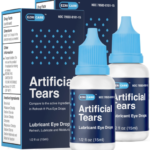

The CDC is recommending that patients and health care providers should immediately discontinue using EzriCare artificial tears pending additional guidance from CDC and the Food and Drug Administration (FDA).
EzriCare Statement
On the same day, EzriCare, based in New Jersey, issued a statement recommending that patients discontinue the use of EzriCare until more information is available. The company also “immediately took action to stop any further distribution or sale of EzriCare Artificial Tears. To the greatest extent possible, we have been contacting customers to advise them against continued use of the product. We also immediately reached out to both CDC and FDA and indicated our willingness to cooperate with any requests they may have of us.”
Global Pharma Healthcare PVT Limited in India manufactures the products, and Aru Pharma Inc imports it into the U..S. It may be sold under different brands. EzriCare notes in its statement that its role “in introducing the product to the market was to design an exterior label and to market it to our customers. EzriCare, LLC had no role in the formulation, packaging delivery system design or actual manufacturing of this product.”
A number of the patients mentioned in the CDC advisory presented with keratitis, and the CDC is encouraging those patients who are currently using EzriCare Artificial Tears to be on the lookout for signs and symptoms of infection. These include “discharge from the eye, eye pain or discomfort, redness of the eye or eyelid, feeling of something in the eye, increased sensitivity to light or blurry vision,” according to the health advisory. The CDC also encourages providers to consider testing patients with keratitis, especially if they are using this product. At this time, the agency is not recommending widespread testing of asymptomatic patients who use this product.
Read More
Read the CDC Health Alert Network advisory here. An advisory is the second highest level of notification. The CDC says advisories provide “important information for a specific incident or situation; may not require immediate action.”
Read the statement from EzriCare here.
Read more News from Women In Optometry.



